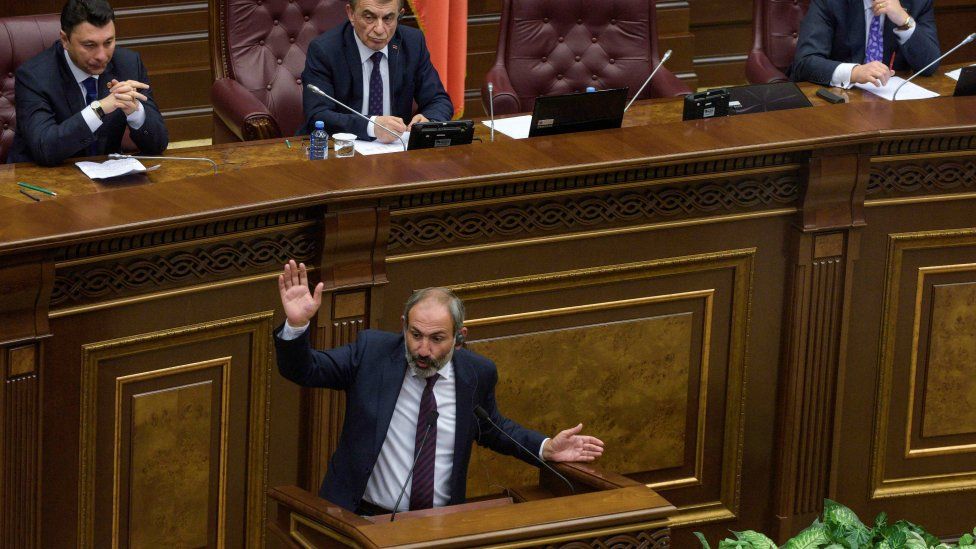Armenia crisis: Opposition leader Pashinyan fails in bid to be PM
- Published

Armenian opposition leader Nikol Pashinyan has failed in his bid to become interim prime minister.
After a day of debate in parliament, he failed to garner enough votes despite being the only candidate for the post.
After the vote, he urged tens of thousands of supporters gathered in the capital Yerevan to begin a campaign of civil disobedience.
He called for a general strike to be launched on Wednesday morning, with roads, railways and airports blocked.
Mr Pashinyan, 42, has led weeks of anti-government rallies that forced former PM Serzh Sargsyan to resign.
He had earlier warned MPs of a "political tsunami" if they did not back him.
What happened in parliament?
Armenia's ruling Republican Party had said it would not put up a candidate, in a bid to ease tensions.
But the protest leader warned there were moves aimed at halting his bid and he urged protesters to stay on the streets to prevent the Republican Party from "stealing the people's victory".
In his address to MPs, Mr Pashinyan said the Republicans had "declared war on the Armenian people", when it became clear they would not support him.
He received 45 votes but needed 53 to secure a majority in the 105-seat chamber.
How did his supporters react?
In Yerevan's Republic Square, Mr Pashinyan's supporters shouted "shame" when the result of the vote was shown on two huge screens.
The opposition leader, accompanied by his wife, arrived in the square soon after, with the crowd chanting "Nikol, Nikol".
"From 8:15 am tomorrow all roads should be blocked, I announce a general strike," he told the crowd.
"A revolution of love and tolerance continues."
Under Armenia's constitution, a second vote for prime minister must be held in seven days' time. If again no candidate is elected, then parliament is dissolved.
Mr Sargsyan, who had served 10 years as president, stepped down last month days after being sworn in as PM. He had been accused of trying to cling to power.
All 47 opposition members of parliament had pledged to vote for Mr Pashinyan, but he needed votes from at least six Republican Party deputies to win a majority in the 105-seat house. The Republican Party has dominated Armenian politics since 1999.
Mr Pashinyan has said he will rid Armenia of corruption, poverty and nepotism and has promised snap elections.
Allow Twitter content?
This article contains content provided by Twitter. We ask for your permission before anything is loaded, as they may be using cookies and other technologies. You may want to read Twitter’s cookie policy, external and privacy policy, external before accepting. To view this content choose ‘accept and continue’.
What has happened in Armenia?
Demonstrators poured on to the streets of Yerevan last month in protest at Serzh Sargsyan's move from the presidency to the post of prime minister.
In 2015, Armenians voted in a referendum marred by irregularities to shift their country from a presidential to a parliamentary system, stripping the presidency of its powers and giving them to the prime minister. Mr Sargsyan had initially vowed he would not seek to stay in power.
Supporters mob Armenian protest leader Nikol Pashinyan after the PM resigns
The protests surged on 17 April when he was elected prime minister by parliament within days of leaving the presidency.
Mr Pashinyan then met his rival for talks, which broke down within minutes when he called for the prime minister's resignation and Mr Sargsyan accused protesters of blackmail.
Mr Pashinyan and some 200 protesters were then arrested.
However, Mr Pashinyan was soon released and the prime minister resigned, admitting he had "got it wrong".
Who is Nikol Pashinyan?
The man with the trademark khaki T-shirt behind Armenia's protests is a former newspaper editor who has spent time in jail for his opposition to the leadership of Serzh Sargsyan.
The son of a sports teacher, Mr Pashinyan came to prominence in 1995 when he began writing about government corruption. He founded a newspaper three years later and went on to take the role of editor at a best-selling daily, which criticised the government of President Robert Kocharyan and then of President Sargsyan.
When Mr Sargsyan was elected president in 2008, Mr Pashinyan was among the leaders of protests that turned violent and left 10 people dead. At that point he went into hiding, surrendering to authorities the following year.
Jailed the following year on charges of murder and organising mass unrest, he was eventually released under an amnesty in 2011.
In 2012 he was first elected to Armenia's parliament. He argues that only he can steer Armenia to free and fair elections.
- Published1 May 2018
- Published29 April 2018
- Published27 April 2018